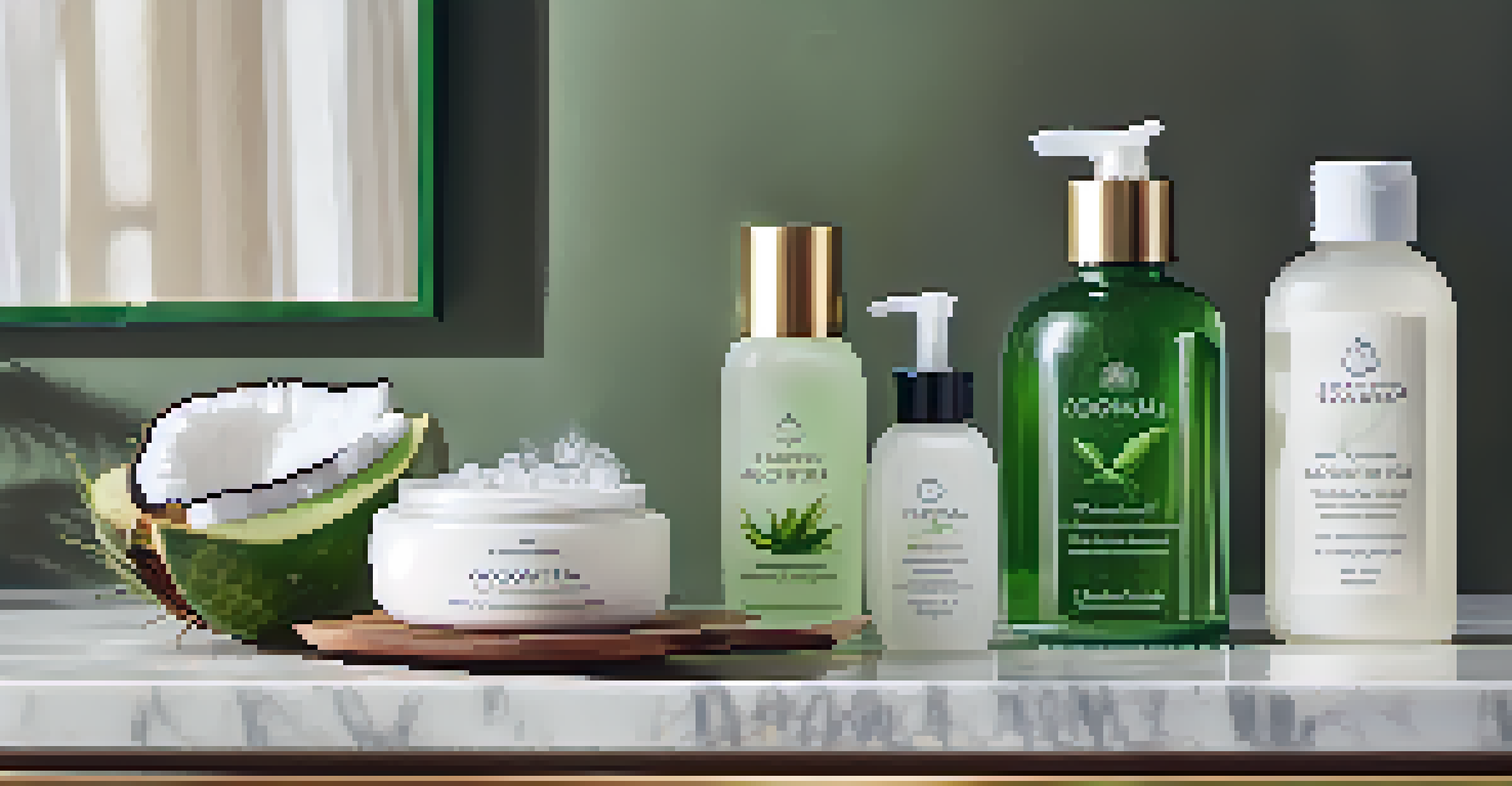Healthy Skin Practices: Caring for Aging Skin Naturally

Understanding Aging Skin and Its Needs
As we age, our skin undergoes several changes, including a decrease in collagen and elasticity. This can lead to wrinkles, sagging, and dryness, making it essential to adapt our skincare routine accordingly. Understanding these changes helps us choose the right products and practices that nourish our skin naturally.
The skin is a reflection of what is going on inside the body.
Moreover, aging skin often becomes more sensitive and may react differently to certain ingredients. This is where the importance of gentle, natural remedies comes into play. By choosing products with fewer synthetic chemicals, we can minimize irritation and support the skin's natural barrier.
It's also worth noting that hydration plays a crucial role in maintaining the skin's appearance. Drinking enough water and using moisturizers rich in natural oils can significantly impact how our skin feels and looks, making it essential to prioritize these practices.
Hydration: The Key to Youthful Skin
Staying hydrated is one of the simplest yet most effective ways to care for aging skin. Water helps maintain skin elasticity and can reduce the appearance of fine lines and wrinkles. Aim to drink at least eight glasses of water daily, and consider incorporating hydrating foods like cucumbers and oranges into your diet.

In addition to drinking water, using a hydrating moisturizer can lock in moisture. Look for products containing natural ingredients like hyaluronic acid or aloe vera, which are known for their hydrating properties. Applying moisturizer immediately after cleansing can help seal in moisture and keep your skin plump.
Hydration is Essential for Aging Skin
Drinking enough water and using hydrating moisturizers can significantly improve the appearance and elasticity of aging skin.
Don’t forget about the impact of climate on your skin's hydration levels. In dry or cold weather, you may need to adjust your skincare routine by using thicker creams or adding a humidifier to your home to maintain optimal moisture levels in the air.
Embrace Natural Ingredients for Skincare
Using natural ingredients in your skincare routine can be a game-changer for aging skin. Ingredients like coconut oil, shea butter, and jojoba oil not only moisturize but also provide essential nutrients. These natural oils can help repair the skin barrier and promote a healthy glow.
Take care of your body. It's the only place you have to live.
Plant-based antioxidants, such as green tea and vitamin E, are also fantastic additions. They help combat free radicals that contribute to aging, allowing your skin to feel rejuvenated. Incorporating serums or creams with these ingredients can enhance your skincare routine significantly.
Always remember to perform a patch test when trying new natural products to avoid any adverse reactions. This step is crucial for anyone with sensitive skin, ensuring that you can enjoy the benefits without discomfort.
Sun Protection: A Must for Aging Skin
One of the most effective ways to care for aging skin is by protecting it from the sun. UV rays can accelerate skin aging, leading to wrinkles, age spots, and even skin cancer. Wearing sunscreen daily, even on cloudy days, is essential for maintaining youthful skin.
Choose a broad-spectrum sunscreen with an SPF of at least 30, and reapply every two hours when outdoors. Additionally, wearing protective clothing and seeking shade can further shield your skin from harmful rays. These small adjustments can make a significant difference over time.
Natural Ingredients Boost Skin Health
Incorporating natural oils and antioxidants into your skincare routine can nourish aging skin and combat the signs of aging.
Don’t underestimate the power of antioxidants in your skincare routine to help protect against sun damage. Incorporating vitamin C serums can enhance your skin’s defenses and brighten your complexion, acting as a perfect complement to sunscreen.
Gentle Cleansing: A Foundation for Healthy Skin
Cleansing is the first step in any skincare routine, and it’s crucial to do it gently, especially as skin matures. Harsh cleansers can strip the skin of its natural oils, leading to dryness and irritation. Opt for a mild, sulfate-free cleanser that respects your skin's barrier.
Cleansing twice daily helps remove impurities without over-drying your skin. In the morning, a gentle cleanse refreshes your face, while in the evening, it removes makeup and accumulated dirt. This simple practice helps maintain the skin's natural balance.
Consider incorporating a cleansing oil or balm, which can be particularly effective for aging skin. These products not only cleanse but also nourish the skin, leaving it feeling soft and hydrated, a perfect way to prepare your skin for the next steps in your routine.
The Role of Diet in Skin Health
What we eat plays a significant role in how our skin ages. A diet rich in fruits, vegetables, whole grains, and healthy fats provides essential nutrients that promote skin health. Foods high in omega-3 fatty acids, such as salmon and walnuts, can help maintain skin elasticity and hydration.
Antioxidant-rich foods like berries and leafy greens combat oxidative stress, which can accelerate skin aging. Incorporating these foods into your meals not only nourishes your body but also contributes to a radiant complexion.
Sun Protection Prevents Skin Damage
Daily application of broad-spectrum sunscreen is crucial to protect aging skin from UV rays and maintain a youthful appearance.
Lastly, reducing sugar and processed foods can have a profound impact on your skin's appearance. These foods can lead to inflammation and breakouts, detracting from your skin's natural beauty. Focus on whole, nutrient-dense foods for a visibly healthier glow.
Regular Exercise for Glowing Skin
Exercise isn’t just good for the body; it’s also fantastic for the skin. Physical activity increases blood circulation, which helps deliver oxygen and nutrients to the skin. This natural boost can give your complexion a healthy, radiant glow.
Moreover, sweating helps to flush out toxins from the body, which can lead to clearer skin. Just make sure to cleanse your face after a workout to remove sweat and prevent clogged pores. This step is vital in maintaining skin clarity and health.

Find an exercise routine that you enjoy, whether it's yoga, dancing, or walking. The key is consistency, as regular exercise can improve not just your skin but your overall well-being. That sense of vitality will reflect on your face, too!